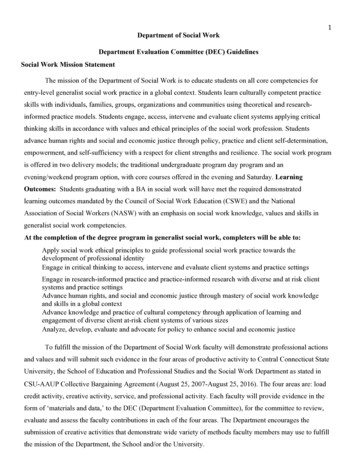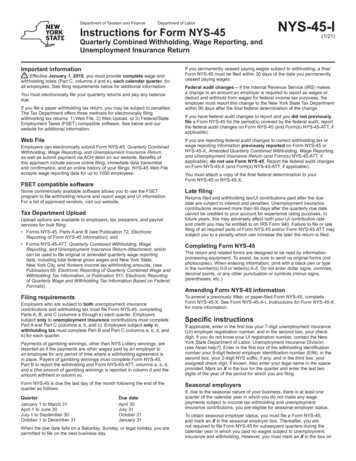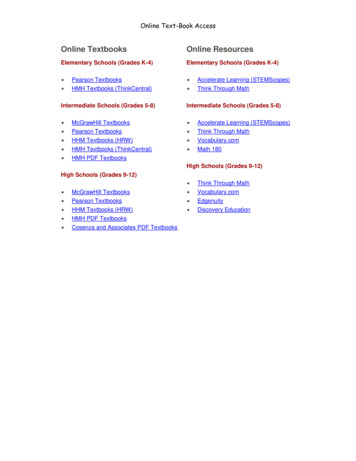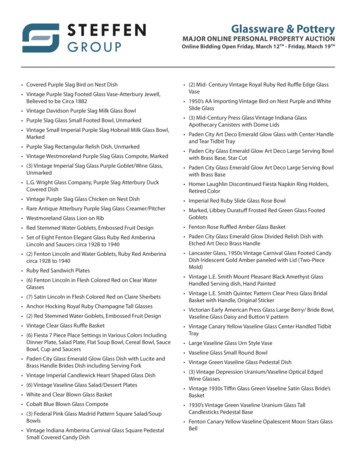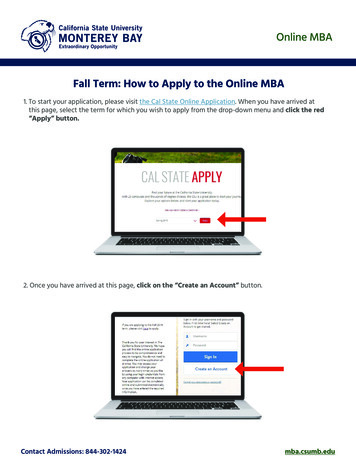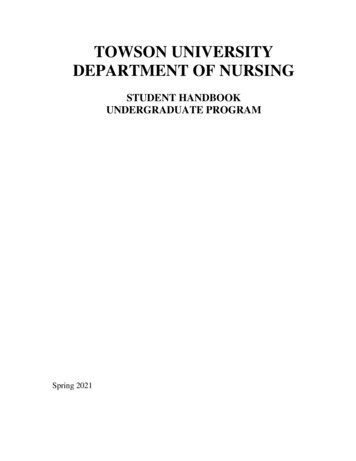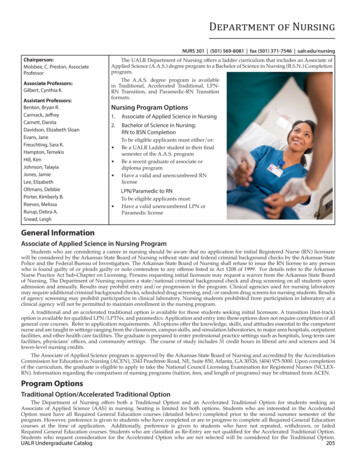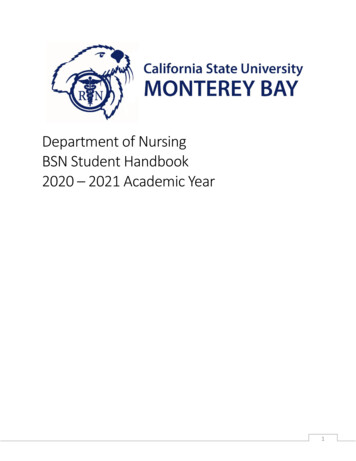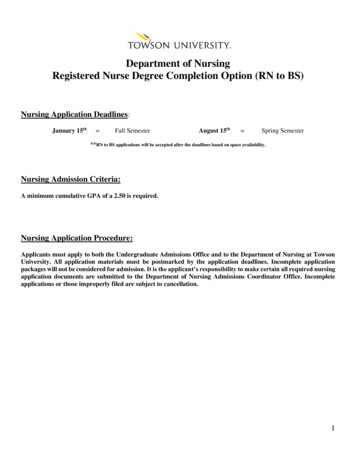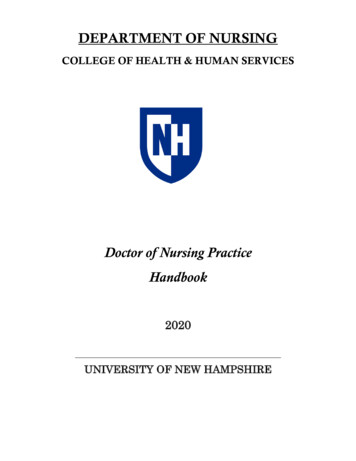
Transcription
DEPARTMENT OF NURSINGCOLLEGE OF HEALTH & HUMAN SERVICESDoctor of Nursing PracticeHandbook2020UNIVERSITY OF NEW HAMPSHIRE
I.INTRODUCTION 1ACCREDITATION 1II.DNP PROGRAM OVERVIEW 2VISION 2MISSION 2PROGRAM GOAL: 2PROGRAM COMPLETION 2ONLINE LEARNING 2III.NEW STUDENTS 3GETTING STARTED 3REGISTRATION INSTRUCTIONS 3ADVISING 3COURSE FORMAT 3TIPS FOR SUCCESS 4IV.DNP PROGRAM OUTCOMES 4DNP CURRICULUM 6V.DOCTOR OF NURSING PRACTICE PROGRAM POLICIES 7COURSE WORK COMPLETION 7DNP PROJECT COMPLETION DATES RELATIVE TO GRADUATION 7USE OF DOCTOR OF NURSING PRACTICE CREDENTIAL 8NURS 980 DNP PROJECT PROPOSAL 8PUBLICATIONS/PRESENTATIONS OF ACADEMIC ENDEAVORS OUTSIDE THE PROGRAM: University and FacultyRecognition 8SUFFICIENT ACADEMIC PROGRESS 9DEGREE REQUIREMENTS 9VI.RULES OF CONDUCT 10ii
UNIVERSITY RIGHTS, RULES AND RESPONSIBILITIES 10STATEMENT ON PROFESSIONAL CONDUCT AND COMMUNICATION 10HIPAA/FERPA POLICY 11ACADEMIC HONESTY 11SOCIAL MEDIA GUIDELINES 12APPEALS PROCEDURE FOR GRADUATE STUDENTS 12GRIEVANCES 12VII.WRITING RESOURCES 12ROBERT J. CONNORS WRITING CENTER 12OFFICE OF INTERNATIONAL STUDENTS AND SCHOLARS 13VIII.GRADUATE ACADEMIC REQUIREMENTS 13GRADUATE COURSES 13GRADING SCALE 13ACADEMIC STANDARDS 15IX.RESPONSIBILITIES IN CLINICAL SETTING 15X.ACCESS AND CONFIDENTIALITY OF STUDENT RECORDS 16XI.ADDITIONAL RESOURCES 16XII.SIGMA THETA TAU INTERNATIONAL HONOR SOCIETY OF NURSING 17XIII.FINANCIAL SUPPORT 18SCHOLARSHIPS 19UNIVERSITY OF NEW HAMPSHIRE COMMENCEMENT 19XIV.PREPARING FUTURE FACULTY 20XV.PROFESSIONAL DEVELOPMENT 21iii
I.NTRODUCTIONThe purpose of this handbook is to bring together important information, and to tell you aboutother sources of information that are either essential or helpful. It is intended to complement,not replace, the rules and regulations as set forth in the University of New Hampshire GraduateCatalog. You should use this as a guide when questions arise regarding any policies governinggraduate students. It is your responsibility to become acquainted with the Graduate School anddepartmental degree requirements and to fulfill these requirements in a timely manner. Youshould be familiar with and understand the policies as referred in the University of NewHampshire Graduate Catalog and the Student Rights, Rules and Responsibilities Handbook.University of New HampshireCollege of Health and Human ServicesDepartment of Nursing220 Hewitt Hall4 Library WayDurham, NH 03824Program Phone: 603-862-2299Fax: 603-862-4771ACCREDITATIONThe UNH nursing programs are nationally accredited by the Commission on Collegiate NursingEducation. The baccalaureate degree program in nursing, the master's degree program innursing, the Doctor of Nursing Practice program, and the post-graduate APRN certificateprogram at the University of New Hampshire are accredited by the Commission on CollegiateNursing Education (http://www.ccneaccreditation.org). Detailed CCNE atement1
II.DNP PROGRAM OVERVIEWVISIONWe embrace a culture that embodies the University's and the College's vision, mission, andvalues of interdisciplinarity, scholarship, innovation, integrity, curiosity, openness, andsustainability.MISSIONWe educate leaders in nursing, engaged in reflective practice, to provide innovative andexemplary healthcare in partnership with individuals, families, groups, and communities. Wetransform the delivery of healthcare through generation, dissemination, and application ofevidence-based nursing knowledge.PROGRAM GOAL: TO PREPARE INNOVATIVE LEADERS IN PRACTICEOur Doctor of Nursing Practice (DNP) program is designed for working advanced practicenursing professionals looking to make a greater impact on the world of healthcare. The lowresidency, DNP Online program is a post-master's, practice-focused program that preparesinnovative leaders in practice.PROGRAM COMPLETIONThe DNP Program is comprised of 11 courses totaling 33 credits that can be completed in 28months. Students are required to complete the program within four years of matriculation.ONLINE LEARNINGTo be a successful online student you need to be: self-motivated, able to manage your time appropriately, comfortable interacting with Canvas and other technologies, and able to express your ideas in writing.Online courses are offered in condensed timeframes, meaning they are not as long astraditional on-campus courses and move at a faster pace.2
III.NEW STUDENTSGETTING STARTEDVisit the Graduate School website to check your application status. Once a student’s status isupdated to Admitted to Program, the student must accept the offer of admission in order to setup your UNH e-mail, register for classes, and access Canvas (the learning management system).REGISTRATION INSTRUCTIONSWhen registering online, you can use the Course Search Form and course descriptions to helpyou find what you need. For complete registration information, visit the Registrar's Officewebsite. Here are the most important things to keep in mind when registering and planningyour program: All graduate students must be registered for coursework every Spring and Fallsemester until you complete your program of study. If you have questions, review ourpolicy on continuous registration.As a new graduate student, you are NOT eligible to enroll in GRAD 800. If you are nottaking course credits or research credits, you may wish to request that your admissionbe deferred to a future term (up to one year) by contacting the Graduate School.Graduate courses are numbered 800- or 900-level.Non-registration: If you are unable to attend for a semester or more at UNH you have acouple of options. See our non-registration policy for more details.ADVISINGDNP students are assigned an advisor upon admission, who will be a doctorally-preparedfaculty from the Department of Nursing. In the event that students are experiencing advisorrelated issues, they are advised to discuss the matter directly with the DNP Program Director,Department Chair, and/or to meet with the Associate Dean of the Graduate School.COURSE FORMATAll courses are offered asynchronously and 100% online. Students are admitted to the DNPOnline Program for cohorts starting in January or August. The academic year consists of five 8week terms: two terms in the fall semester, two in the spring semester, and one in the summersession. View sample schedules. The online academic calendar gives students regularscheduled time off between terms. Click “On-line Programs” on right hand side menu.3
Students will find the DNP Online Program Resource Center in Canvas under myCourses. Fromthe home page, click on Modules on left side menu and complete the DNP Orientation at yourown pace. Ideally, students should complete the DNP Orientation prior to starting their firstcourse but all students must complete the DNP Orientation before attending the first residency.Once completed, the student will have ongoing access to the remaining modules with DNPProgram information and UNH policies, resources and services.TIPS FOR SUCCESSStudents are responsible for maintaining frequent communication with their advisors andfaculty mentors throughout the program. The academic advisor will help you identify youracademic and career goals and assist you in developing an academic plan to achieve them.Advisors are also experts at helping you understand the policies and procedures of theUniversity and the Department of Nursing and guiding you through the admission, progression,and graduation requirements of the DNP program. Students are ultimately responsible for theiracademic progress. Students are expected to become familiar with their curriculum and enrollthemselves into their courses. Advisors are available to respond to your questions andconcerns.To succeed as a graduate student means more than simply doing well in your course work.Healthy lifestyle behaviors are important to maintaining academic/life balance. Selfmotivation, self-discipline, time management, and the ability to prioritize are all essentialingredients to graduate school success.IV.DNP PROGRAM OUTCOMESOur DNP program graduates have been successful in career advancement. DNP graduates havebeen promoted into leadership positions, hired as nursing faculty and become clinical experts inpractice. Graduates have been successful in publishing their work and selected to present atnational and regional conferences.The DNP program outcomes reflect integration and application of the knowledge and skillsobtained in the program. Graduates of the program will meet the outcome competencies andupon completion of the program will be able to:4
Serve in a healthcare leadership and change agent role as part of a diverse, complex, andpatient-centered health care system. Act as a practice scholar to design, direct and evaluate system changes to promote safe,timely, effective, efficient, equitable and patient-centered care. Use data analytic methods, information systems and technology to evaluate, integrateand apply knowledge that will improve programs of care, outcomes of care and caresystems. Use translational science and analytic methods to develop, identify, implement, andevaluate best practices to improve health care and health care systems. Design and implement health promotion and clinical prevention strategies across thehealth/illness continuum to optimize health and disease management. Systematically use improvement methods to monitor and evaluate care processes andoutcomes and applies data for continuous improvement and safety. Advocate for social justice through policy, professional and political engagement. Apply leadership principles that support inter-professional practice. Employ strategic leadership skills to shape practice environments to produce positive,patient centered, healthcare outcomes at individual and system levels. Facilitate inter-professional collaboration to implement practice models, peer review,practice guidelines, health policy, and standards of care.5
DNP CURRICULUMDNP Curriculum is comprised of 11 courses (each 3-credits), total of 33 creditsDNP Core Curriculum* (8-week blocks)NURS 894: Special Topics/ Creative Leadership: Embracing Disruption and InnovationNURS 894: Special Topics/ Healthcare Finance ManagementNURS 894: Special Topics/ Applied Analytics for Quality Improvement in Health CareNURS 963: Advanced Clinical EpidemiologyNURS 964: Technology and Health CareNURS 967: Evidence SynthesisNURS 969: Health Policy and AdvocacyNURS 973: Healthcare QualityDoctoral Scholarly Courses (spans 40 weeks)NURS 980: Doctoral Scholarly Project INURS 981: Doctoral Scholarly Project IINURS 982: Doctoral Scholarly Project III*In addition to the core courses, an elective course, NURS 970: Clinical Practicum for AdvancedPractice Nurse, is a 2-credit course offered for students who do not bring 500 postbaccalaureate supervised clinical practicum hours into the program. Students may complete upto 250 clinical practicum hours in this course and may register for this course a second time tofulfill the 500 clinical hour requirement prior to enrolling in the Doctoral Scholarly Project coursesequence. Another 500 clinical hours will be completed during NURS 980, 981 and 982 to fulfillthe DNP requirement of 1000 post-baccalaureate clinical practicum hours in order to graduate.Sample course schedules are available on line.6
V.DOCTOR OF NURSING PRACTICE PROGRAM POLICIESStudents who are enrolled in the Doctor of Nursing Practice Program (DNP) are subject to thepolicies pertaining to Graduate Nursing Students as well as the following DNP-specific policies.COURSE WORK COMPLETIONStudents who do not complete the course requirements within the designed time period willmeet with the course faculty to determine if it is feasible to attempt to complete the requiredwork and, if so, negotiate a plan relative to such completion. It is preferred that the majority ofall core courses must be completed prior to progressing into NURS 980, Doctoral ScholarlyProject I. Students must successfully complete NURS 980, Doctoral Scholarly Project I, with anapproved DNP Project Proposal and QI determination from the clinical agency and theDepartment of Nursing before progressing into NURS 981, Doctoral Scholarly Project II. InNURS 981, Doctoral Scholarly Project II, students implement their DNP project. To successfullycomplete NURS 982, Doctoral Scholarly Project III, students evaluate and disseminate their DNPproject and submit an approved DNP Project Final Report in the UNH Scholars’ Repository.For students who have an IA grade in Doctoral Scholarly Project course, they must register forGRAD 800, Continuing Enrollment, each full semester (fall or spring) until work is complete inorder to remain active and avoid having degree status discontinued. GRAD 800 carries a 200fee. Students are required to complete the DNP program within 4 years of matriculation.DNP PROJECT COMPLETION DATES RELATIVE TO GRADUATIONTo be eligible for graduation, all degree requirements must be successfully completed.Students may graduate in May (variable dates), September 1 or December 31. The Universityoffers one commencement ceremony held in May of each year. All students eligible to graduateare invited to attend UNH Commencement and the Doctoral Hooding ceremony in May.Doctoral students may not “walk” at graduation with incomplete course work. Students arealso invited to the Doctoral Luncheon held on campus the day before commencement in May.A completed DNP Project is defined as implementation of the entire research/evidence basedpractice project, including data collection and analysis, successful oral presentation of the DNPProject, and submission of the finalized approved written document of that project into theUNH Scholars’ Repository.Course Incompletes: Any NURS 982 student who does not have the completed, approved andfinalized written DNP Project Final Report will receive an IA grade for that term. Students with7
an IA grade in NURS 982 will not be eligible for graduation until the work is successfullycompleted.If the student does not meet the requirements to participate in the May ceremony, the studentcan participate in Doctoral Hooding at Commencement ceremony in a subsequent year at atime after all requirements are satisfied. Student must register for GRAD 800 each subsequentterm through program completion.USE OF DOCTOR OF NURSING PRACTICE CREDENTIALDNP students may use the DNP credential when they have completed their DNP Project and allother DNP program requirements are met. The Department of Nursing does not endorse using(c) after the DNP credential to indicate candidacy for the degree while the degree is in progress.NURS 980 DNP PROJECT PROPOSALAll Doctoral Scholarly Project courses are Credit/Fail. The DNP project proposal that studentssubmit in NURS 980, Doctoral Scholarly Project I, must achieve a grade of 80 or better in orderfor the student to successfully complete this course. If this critical element is not met, thestudent will receive an “F” for the assignment and will not be successful in passing the course,resulting in a final course grade of “F.”PUBLICATIONS/PRESENTATIONS OF ACADEMIC ENDEAVORS OUTSIDE THEPROGRAM: University and Faculty RecognitionStudents in the Doctor of Nursing Practice program may have the opportunity to communicatethe substance or results of papers and DNP projects that were developed while enrolled incourse work. Certainly, this is encouraged and appropriate for students enrolled in advancedstudy. These outside communications may take such forms as oral or poster presentations,and/or publications in any professional or lay print media. It is expected that these publicationsand oral or poster presentations be reviewed by faculty who have overseen the project, or intheir absence, the Director of the DNP program, prior to the presentation or publication. Anyscholarly presentations or publication of work completed in any DNP course must includestudent acknowledgement of the University of New Hampshire. In addition, any scholarly workpresented or published as a result of completing DNP Project must also include recognition ofthe DNP Project Team and/or Faculty Mentor.Publications (electronic/print) and/or presentations (podium/poster, etc.) related to workcompleted in DNP courses must have acknowledgement that work was completed as partial8
fulfillment of completion of the DNP program at the University of New Hampshire. Members ofthe DNP Project Team should be acknowledged individually in publications/presentationsderived from the NURS 982, Doctoral Scholarly Project III. If a faculty member works with astudent in the authorship of any manuscript, the faculty should be listed as co-author.SUFFICIENT ACADEMIC PROGRESSThe definition of sufficient academic progress in the Doctor of Nursing Practice program issuccessful completion of the program, with no more than 3 consecutive terms where no coursehas been taken AND completion of the program within 4 years of beginning doctoral courses asa matriculated student. A single term is defined as an 8-week block in the course carousel. Anystudent who does not take a course in 3 consecutive terms (without a formally requested leaveof absence-LOA) or has not completed the program in 4 years will be dismissed from the DNPprogram. Students may submit a Leave of Absence Request form to the DNP Program Directorfor extenuating circumstances. The LOA must state the anticipated return date, not greaterthan one year. An approved LOA will be exempt from the 3-term policy and the terms withinthe LOA will not count toward the 4-year completion policy. At the anticipated return date, thestudent must enroll in a course or withdraw from the program. If a student is accepted into theDNP program and does not attend in the cohort to which they are admitted, they can deferadmission for up to one year. After that time, if they are not enrolled in a course, theapplication will be deactivated, and they will need to re-apply to the program.DNP COURSE TRANSFERStudents who received a post-master’s certificate or a previous master’s degree from theUniversity of New Hampshire, for which they completed courses in the DNP program, will beallowed to transfer up to two courses into the DNP program as long as there was successfulcompletion (B- or higher) for each course.DEGREE REQUIREMENTSTo graduate from the DNP Program the student must successfully: Implement a quality improvement or health policy projectComplete an approved DNP Scholarly Project Final Report and Oral PresentationComplete a minimum 1000 post baccalaureate practicum hoursSubmit a publishable manuscript into the DNP PortfolioSubmit DNP Scholarly Project Final Report to UNH Scholars’ Repository.9
VI.RULES OF CONDUCTUNIVERSITY RIGHTS, RULES AND RESPONSIBILITIESDepartment of Nursing policy for Academic Honesty follow the policies as written in theStudent Rights, Rules, and Responsibilities. The Misconduct in Scholarly Activity policy isapplicable to all members of the UNH community including faculty, staff and students.A valuable resource for your review is University of New Hampshire Graduate Catalog. Note,the doctoral degree requirements refer to PhD programs only and DNP program requirementsare included in this handbook.STATEMENT ON PROFESSIONAL CONDUCT AND COMMUNICATIONCivility is the art of treating others as well as ourselves with respect, dignity, and care. Civility isapparent when we are sensitive to the impact that our communications, practices, andbehaviors have on others and when we acknowledge each person’s self-worth and uniquecontributions to the UNH community as a whole. As members of the University of NewHampshire, the College of Health and Human Services, and the Department of Nursing, we arecommitted to learning and practicing ways that support caring, social justice, and relationshipcentered actions. The following are examples of beh
ROBERT J. CONNORS WRITING CENTER 12 OFFICE OF INTERNATIONAL STUDENTS AND SCHOLARS 13 VIII. GRADUATE ACADEMIC REQUIREMENTS 13 GRADUATE COURSES 13 . The baccalaureate degree program in nursing, the master's degree program in nursing, the Doctor of Nursing Practice program, and the post-graduate APRN certificate .
